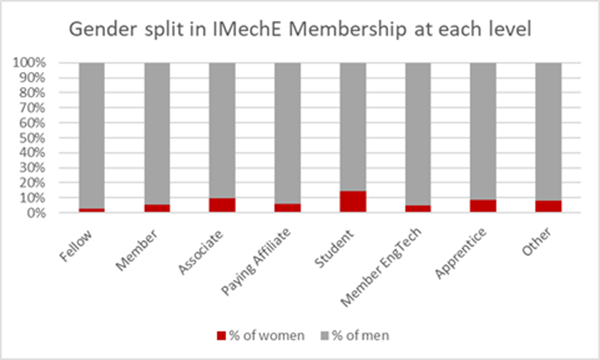Institution news
The numbers are in, and the news is disappointing although perhaps not surprising. Only 9.3% of all IMechE Members - including Affiliate, Associate, Member and Fellow - are women. This figure was only 7% back in 2014; things are improving, but progress is painfully slow. So, what is being done to improve this?
With over 120,000 Members in 140 countries and a heritage going as far back as 1847, the IMechE is a hallowed institution that Members are proud to be a part of. Becoming a Member and Fellow of the IMechE is a huge achievement in the career of a professional engineer. The IMechE’s strapline “Improving the world through engineering” is inspirational. So why is the IMechE not attracting more women to join?
Some may say the lack of female IMechE membership is inevitable given the diversity challenge in the UK engineering industry. In 2018, 15% of engineering and technology undergraduates in the UK were women1 compared with India where over 30% of engineering students were women2. This percentage reduces further when women move into jobs where only 12.4% of UK engineering jobs are held by women today - the lowest rate in Europe3. In places like Latvia, Bulgaria and Cyprus nearly 30% of engineering professionals are female4.
So, what are we doing in the UK to put women off engineering? What can we as the mechanical engineering profession do to improve the diversity of our membership in the face of such sobering figures, especially given the IMechE is a global Institution?
Being involved with international movements like INWED is a good start. INWED is a global awareness campaign to raise the profile of women in engineering and focus attention on the amazing career opportunities available to women in our industry. This campaign was started by the Women's Engineering Society (WES), of which I am a proud member. This year WES are celebrating their 100th birthday so 2019 is set to be the biggest INWED yet!
Given the numerous studies showing the positive effects of diversity in engineering and other professions, those championing for a better outcome are to be lauded. However, despite these huge efforts, progress seems frustratingly slow. The challenges normally cited are:
- a lack of female engineering role models
- poor public perceptions of engineering as a career
- gender-stereotyping
- working environments that are not inclusive for women.
The issues are wide-ranging and complex so it’s hard to know what diversity initiatives will have the most impact on improving the situation and thus where to focus resource and effort.
Perhaps we need a greater focus on measuring the impact of diversity initiatives and understanding what has the biggest influence on factors that lead to greater recruitment and retention of women in engineering? Then, it will be clear to organisations and institutions what kinds of activities to focus on and invest in.
You may be pleasantly surprised to know that the IMechE has a Diversity & Inclusion Committee that provides guidance and advice to the Trustee Board on matters related to diversity and inclusion. The IMechE also offers free online diversity and inclusion training to all Members and volunteers of the Institution.

These are positive steps for the IMechE. However, it’s hard to know how well the Institution is performing on D&I without data to benchmark and monitor progress against their objectives. Knowing the current gender split across different levels of membership is a good start (shown in figure below). This shows the highest percentage of women are in the Student membership category with 14.5%, but only 5.6% of Members and only 3% of Fellows are women.

There is clearly a lot of work to be done but continuing to work towards these D&I objectives is important and it would be great to see the Institution do this in a transparent way with visibility of progress to Members.
Keeping the well-loved tradition and heritage of the IMechE in conjunction with a modern more progressive approach to D&I will help the Institution maintain its reputation and influence as a leading engineering institution in the world. The theme for INWED2019 is #TransformTheFuture. Let’s be inspired by this and use the power we have as engineers to make a difference by working towards a better-balanced engineering profession both in the IMechE and beyond.
About the Author
Alexandra Knight is a Chartered Engineer and Fellow of the IMechE. She is a Technical Director at Amey Strategic Consulting and passionate about improving diversity in engineering. She is an active member of the WES London Cluster Committee, Amey Consulting’s Gender Parity committee, the Women@Ameynetwork and a STEM Ambassador.
Sources
- WISE 2018 Statistics, calculated from raw data taken from the Higher Education Statistics Agency data on student outcomes.
- Engineering Is a man’s field: Changing a stereotype with a lesson from India, Scientific American, 2013.
- Engineering UK report 2018.
- The Guardian, 4 Nov 2013.